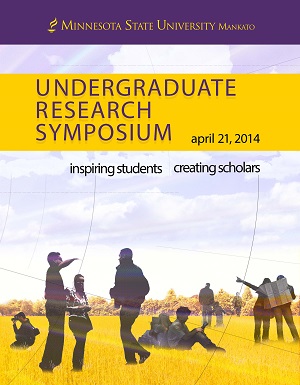Event Title
Opinions and Perceptions Surrounding Cognitive Enhancer Use in a College Population
Location
CSU Ballroom
Start Date
21-4-2014 2:00 PM
End Date
21-4-2014 3:30 PM
Student's Major
Psychology
Student's College
Social and Behavioral Sciences
Mentor's Name
Dawn Albertson
Mentor's Email Address
dawn.albertson@mnsu.edu
Mentor's Department
Psychology
Mentor's College
Social and Behavioral Sciences
Description
In its most general form, “cognitive enhancement” can be viewed as the utilization of external resources by an individual to improve their cognitive capacities, such as memory, concentration, and/or focus (Lanni et. al, 2008). Historically, conventional enhancement of cognitive capabilities has been obtained though avenues such as the consumption of caffeine, consumption of vitamins, or the usage of “brain training” activities, like crossword puzzles. More recently, cognitive enhancement has been made widely available through the use of prescription medications, such as Adderall. While these medications have undoubtedly aided countless students who need it and have the proper prescription, illicit usage rates have been consistently on the rise (Desantis and Hane, 2010). While many studies have shown a willingness by students to obtain cognitive enhancement through pharmaceutical means (Sattler, Sauer, Mehlkop, Graeff, 2013), less focus has been placed on why this willingness exists, which was one of the key aims to this study. In the study, 135 undergraduate students at Minnesota State were asked to anonymously and privately report details and opinions regarding their own cognitive enhancer use or abstinence. Data analysis took a look at the relationships between prescription medication use throughout three levels (students who admit to using with a prescription, admit to using without a prescription, and those who abstain from using) and a variety of other metrics, including perceived safety, perceived efficacy, and ethics of use. These metrics were also used and analyzed in comparison to perceptions about “conventional” cognitive enhancer use.
Opinions and Perceptions Surrounding Cognitive Enhancer Use in a College Population
CSU Ballroom
In its most general form, “cognitive enhancement” can be viewed as the utilization of external resources by an individual to improve their cognitive capacities, such as memory, concentration, and/or focus (Lanni et. al, 2008). Historically, conventional enhancement of cognitive capabilities has been obtained though avenues such as the consumption of caffeine, consumption of vitamins, or the usage of “brain training” activities, like crossword puzzles. More recently, cognitive enhancement has been made widely available through the use of prescription medications, such as Adderall. While these medications have undoubtedly aided countless students who need it and have the proper prescription, illicit usage rates have been consistently on the rise (Desantis and Hane, 2010). While many studies have shown a willingness by students to obtain cognitive enhancement through pharmaceutical means (Sattler, Sauer, Mehlkop, Graeff, 2013), less focus has been placed on why this willingness exists, which was one of the key aims to this study. In the study, 135 undergraduate students at Minnesota State were asked to anonymously and privately report details and opinions regarding their own cognitive enhancer use or abstinence. Data analysis took a look at the relationships between prescription medication use throughout three levels (students who admit to using with a prescription, admit to using without a prescription, and those who abstain from using) and a variety of other metrics, including perceived safety, perceived efficacy, and ethics of use. These metrics were also used and analyzed in comparison to perceptions about “conventional” cognitive enhancer use.
Recommended Citation
Ardner, Benjamin. "Opinions and Perceptions Surrounding Cognitive Enhancer Use in a College Population." Undergraduate Research Symposium, Mankato, MN, April 21, 2014.
https://cornerstone.lib.mnsu.edu/urs/2014/poster_session_B/32



